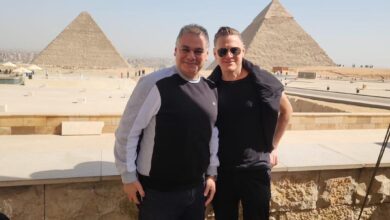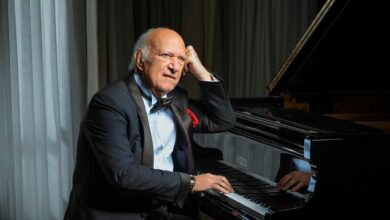Oh homeland we left you, and my tears fled away and died / Homeland you were our hope, and one day it was you that we did not find / A rook shouted in the horizons, torn walls and houses / Wish we would have lost our eyes, and our homeland stayed and never faded away.
After training as an actress, storyteller and singer for three years in Al-Warsha theater troupe, Dina El Wedidi is delving into the music world with her own band and original tracks. "Ya Belad" (Oh, Homelands) is one of three songs she released over the past year.
“Being in a troupe that works on reciting and exploring Egyptian folklore in depth was a great experience for me,” Wedidi tells Al-Masry Al-Youm. “I developed a special passion for ‘Adid,’ the art of mourning of the south. As sad as it might be, it still holds wonderful lyrics and endless possibilities for re-arrangement and emotional expression.”
Wedidi's song reflects different moods and styles; this year she produced the jazzy “Wahda” (One), folk-like “Ya Belad” and contemporary “Al-Haram” (The Forbidden). After they were posted on YouTube, Wedidi’s songs caught the attention of the growing audience of underground Egyptian bands. Wedidi's fans particularly like "Al-Haram":
What’s forbidden is not to sing / What’s forbidden is not to fall in love / What’s forbidden are words, half of which are lies.
“I am still in the phase of creating an identity for my project. However, the public’s reception of my few trials was quite encouraging. I believe that my band and I will gradually develop a unique sound of our own. Until now, we have a combination of instruments and genres that cannot be labeled under one category,” she says.
Wedidi works with contemporary poets Montasser Hegazy, Gerges Shokry, Iyad Abu Bakr, Islam Abdel Moety, Mido Zoheir and Ibrahim Abdel Fattah, along with a group of enthusiastic young musicians, to present a new face to the underground scene that reflects the rapid developments of the last decade.
Unlike many budding artists who complain about the marginalization of underground bands, Wedidi is optimistic.
“Underground bands stand better chances now with the opening of performance venues like Al-Genaina Theater, El Sawy Culture Wheel, Rawabet Theater, the Jesuit cultural centers and Bibliotheca Alexandrina. It wasn’t like that five years ago. Plus, we now have more outdoor festivals and the movement is growing in the whole Arab world,” she says.
When Wedidi decided to leave Al-Warsha and focus on her singing career, she participated in several workshops by Grammy Award winner Fathy Salama.
“Salama is one of a kind in Egypt,” says Wedidi. “He still makes time to educate and work with amateurs. Even if one doesn’t like Salama’s music genre, workshop participants benefit from his broad expertise and dedicated efforts,” she contends.
Wedidi and her band bring together a variety of instruments relatively new to the music scene. They use Oriental instruments, assisted by a background of rock combo: accordion, trumpet, Irish violin, base guitar, classic piano and percussion. Wedidi, who creates her own melodies, and the musicians are motivated by a strong desire for experimentation and creating an authentic sound. Fusing Oriental and rock instruments is a growing trend in the underground music scene, as bands aspire to develop a contemporary Egyptian musical identity and guide the market away from traditional pop styles.
Female bands are also a rising phenomena in Egypt and a leading female singer like Wedidi and her band enrich the music scene.
“I was very inspired by the January uprising; still, I see our generation trapped and estranged inside our country. From this particular point, I see my project emanating, expressing despair and hope, cynicism and love.”
Dina El Wedidi will perform 27 October at Al-Azhar Park’s Al-Genaina Theater. The concert starts at 8:30 pm.




